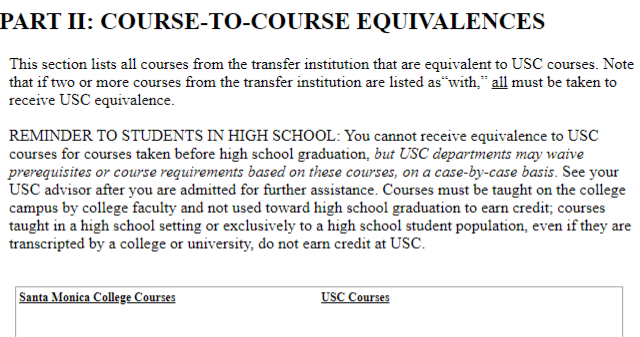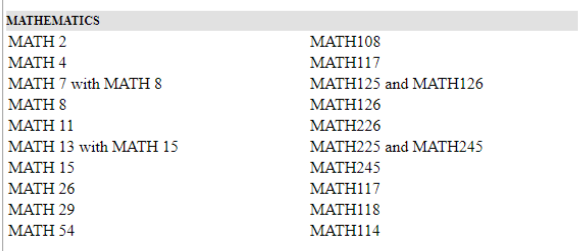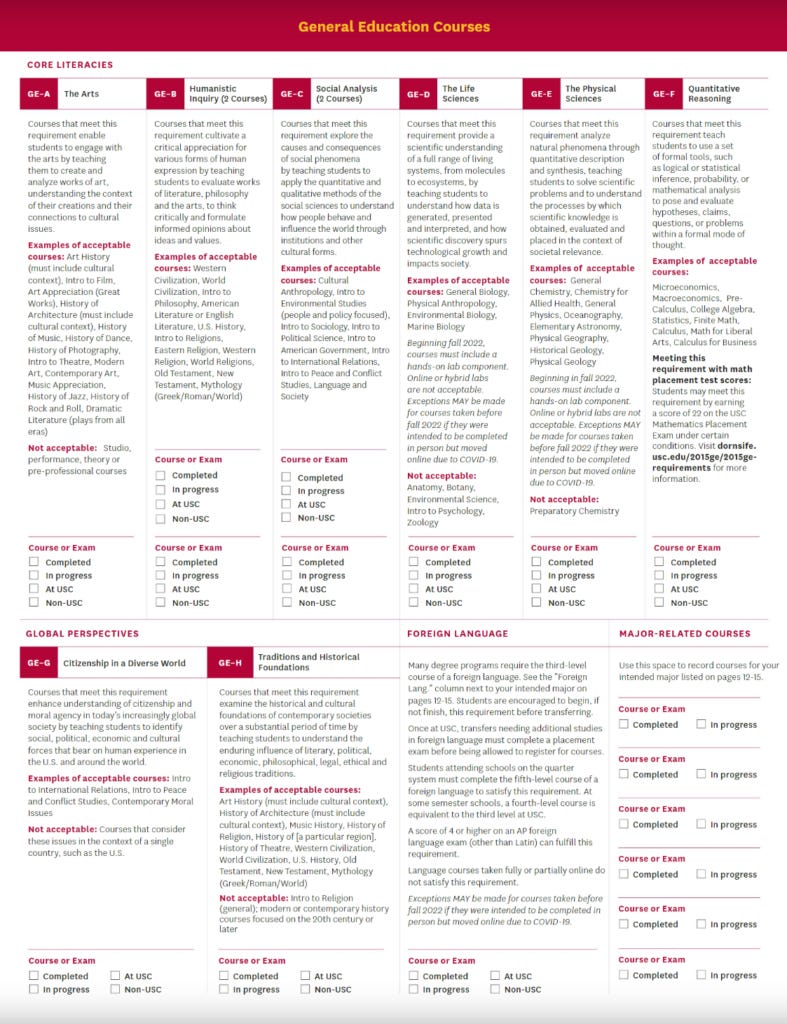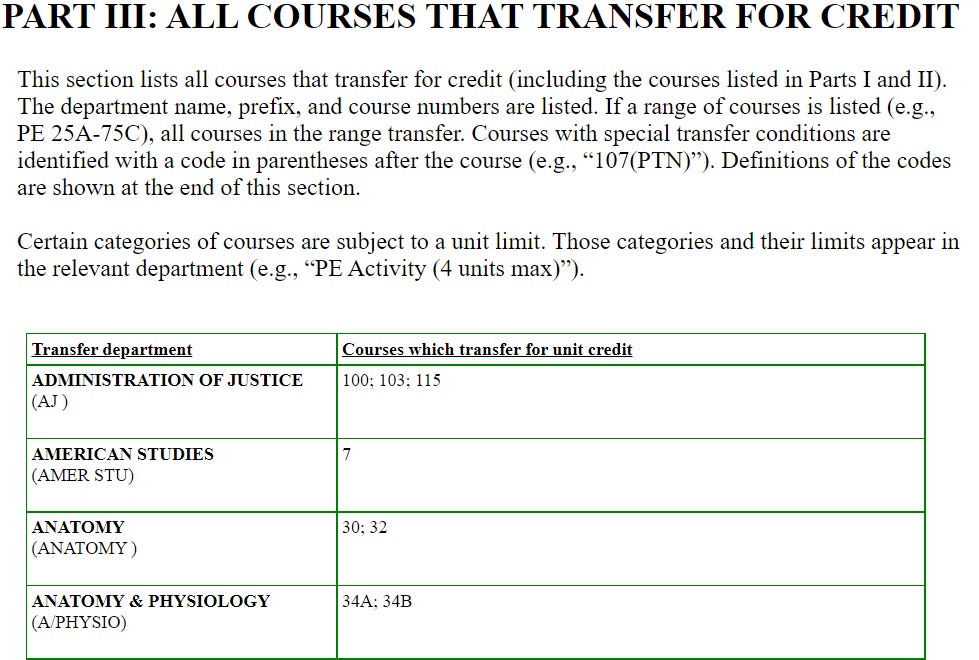Planning Your Transfer to USC
This is a long read, but our hope is it will leave you feeling empowered and ready to navigate the USC transfer process! The key to a successful transfer to USC is good planning. This guide will provide a breakdown of how to plan your course of study and prepare a strong transfer application to USC. We also highly recommend attending a Transfer Information Session which are available in-person or online.
While there are no guarantees in the USC admission process, we would like to share what is typical of our successful transfer applicants. This is by no means prescriptive as we review our applicants holistically. However, planning a course of study that mirrors the academic experience and rigor of a USC student as closely as possible will help you stay on track and maximize your chances of admission.
There are three primary elements of preparing a strong course of study:
Priority #1: Maintain full-time enrollment in academic, transferable coursework
USC students typically enroll in 16 units of academic work per semester, which is usually 4 classes. A significant aspect of showing preparation for USC is demonstrated ability to be successful in full-time academic coursework.
Competitive candidates typically complete 14-16 transferable units per term, typically four classes per term.
We understand that some students are unable to maintain consistent full-time enrollment due to obligations at work or home. If this applies, you should explain your part-time status (along with any other necessary context, such as gaps in enrollment) in your application.
Priority #2: Degree Progress: Planning your Course of Study
There are a few resources that you should utilize to identify and select the courses that you should take at your current school.
Transferring to USC Brochure: A detailed overview of the process of transferring to USC, particularly useful for its list of recommended and required courses by major on pages 12-15 and explanation of USC’s transfer credit policies on page 16.
Articulation agreement: Agreements provide lists of courses from most California community colleges that will be accepted for transfer credit. These lists indicate what courses that fulfill General Education, as well as equivalents to lower-division courses.
Articulation history: Histories list courses previously evaluated and accepted for transfer credit from schools without official agreements. However, we cannot guarantee courses will transfer the same way again. If courses are not listed on the history, this means they have not yet been reviewed and may or may not transfer.
When selecting courses to take prior to transferring to USC, here’s what your course priorities should be (in order of importance):
Complete minimum requirements for transfer:
The first order of business is to make sure to successfully complete our minimum requirements. We have two requirements you must satisfy by the conclusion of the spring in which you apply in order to receive admission consideration.
A. Complete a course equivalent to the lower-division writing requirement at USC: WRIT 130 (also known as WRIT 150 when taken at USC).
If there is a course equivalent at your school, it will be found under Part I of your school’s Articulation document (example shown below). If your school does not offer a course equivalent to USC’s lower-division Writing course, this requirement can be waived for admission purposes.
*The example shown above indicates there are two possible courses available at this school that are likely to fulfill the writing requirement: ENGLISH 2 or ENGLISH 31.
B. Mastery of Algebra II in high school, or Intermediate Algebra in college with a grade of C or better. This is a minimum math requirement; many majors will require higher level math.
Courses for your major:
After ensuring you’ve met our minimum admission requirements, your next priority should be completing equivalent courses at your current institution that are required and/or recommended for your intended major at USC. The Transferring to USC brochure lists these courses on pages 12-15.
You should cross-reference the Additional Coursework by Major section with Part II: Course-to-Course Equivalencies of your institution’s articulation document
For example, the equivalent of USC’s Math 118 or Math 125 are required for admission consideration for the Marshall School of Business. A Business Administration applicant may find the course(s) at their institution that are granted equivalency to USC’s calculus courses under Part II of their school’s Articulation document.
If your institution does not offer an equivalent course, you should take the course that most closely aligns with the recommendation or requirement described in the brochure.
USC’s General Education (GE) Curriculum
Next up, you should prioritize the completion of courses that satisfy USC’s GE requirements. All USC students are required to complete the GE curriculum in order to graduate from USC. There are TEN courses across EIGHT different categories. The maximum number you can complete prior to transferring is EIGHT as TWO courses must be completed at USC. You are not required to complete all eight; however, you should be making strong progress.
California community college: Part I of your Articulation agreement will provide a clear list of the various courses available at your school that fulfill GE categories at USC
If you don’t attend a college with an articulation agreement or comprehensive articulation history, use the Transferring to USC brochure examples of acceptable courses by name for USC’s GE categories. Do your best to select courses that mirror those listed as acceptable in the brochure.
*Make sure you’re looking at the right GE requirements, as students who began college prior to fall 2015 have a link at the top of the articulation document to view their GE courses).
Foreign language and Electives
Certain majors at USC require a third level of a foreign language for graduation. This will be indicated by a red checkmark in the Transferring to USC Brochure. By starting your foreign language progression early in college, you will be in a better position to graduate on time from USC.
If you’ve completed all the available courses at your institution to meet our requirements and the recommended courses for your major, you should make sure your remaining courses are transferable for elective credit. These can be found under Part III of your articulation document (example below).
Priority #3: Strong Academic Performance:
In 2022, the average college GPA of admitted transfer students to USC was a 3.83. Keep in mind, this is an average. We take other factors into account when reviewing a transcript, such as academic trajectory and trend in grades. Many transfer students with a positive grade trend are admitted to USC who fall under that average. Please be aware we do not honor other schools’ academic “renewal” or “forgiveness” programs that permit students to improve a substandard grade. Outside of COVID grading policies, you should also avoid pass/no pass grades. It is recommended to take a course for a letter grade if that is an option. Finally, make sure to avoid course withdrawals resulting in Ws.
The Application Process
Our application review process at USC is holistic. Evaluation of transfer applications is based on different factors, including progress toward intended degree, academic performance, and the non-academic components of a transfer application – especially the supplemental auditions or portfolios required by some majors.
The Common Application: All Transfer applicants to USC must apply using the Common Application. Once in USC’s application, click Program Materials > Questions, and then indicate which is your first and your second choice major, if you have a second choice. You must apply directly to a major at USC.
Application Deadlines: Most transfer applicants have until February 15 to submit their application to USC. If you are applying to the Iovine and Young Academy; Kaufman School of Dance; Thornton School of Music; or to BFA programs in either the School of Cinematic Arts or School of Dramatic Arts you must submit your application by December 1. All transfer applicants who have a complete application submitted by their intended program’s deadline will be considered for the Transfer Merit Scholarship.
Official final high school transcript: Submit an official final high school transcript showing graduation date. If you did not finish high school, you should submit transcripts showing any grades received before leaving, as well as a copy of completion certificate (such as a GED).
Official college transcripts: Submit official transcripts from any and all colleges you have attended (regardless of whether coursework or degree requirements were completed). To be considered official, transcripts must be sent to USC directly from your school. Self-uploaded copies are not considered official.
Application Fee Waivers: If the application fee is a financial burden, you can select the fee waiver option in the My Application section of Common App. USC school-specific fee waiver options can be found in the Program Materials section of the Common Application.
Scholarships and Financial Aid: All transfer applicants submitting their application by February 15 will be considered for the Transfer Merit Scholarship. Other scholarships are also available but may require a separate application. Visit our website for more details. We also offer need-based financial aid at USC. To be considered for need-based financial aid, prospective transfer students must submit FAFSA* and the CSS Profile by March 2. California residents should also apply for Cal Grants by March 2.
* Undocumented or DACA students should submit their 2022 tax return and third-party letter confirming undocumented status instead of the FAFSA.
Additional Materials: A portfolio, audition, and/or additional writing samples may be required by some majors. When you select your major(s) on the common application, any additional requirements for your major will also populate.
International Applicants: All international transfer applicants must submit a Financial Statement of Personal or Family Support. International students whose native language is not English must also demonstrate English-language proficiency.
Application Timeline: Transfer candidates will receive either an admission decision or a request for spring grades by May 31. If you receive a request for spring grades, you will be notified of an admission decision by mid-July.
We hope this guide has been helpful. For further guidance, you should check out this the USC Office of Admission – Transfer Applicants page or attend a transfer information session either in-person or online. You may also reach out to your admission counselor for additional questions. We wish you the very best of luck and look forward to reading your application!
Looking for more transfer-related blogs? Check out these blogs posts Tips For Your USC Transfer Application, USC’s Glossary of Transfer Applicant Terms, and Will My Courses Transfer?
Written by: Chelsea Kaufman, Associate Director - USC Office of Admission







